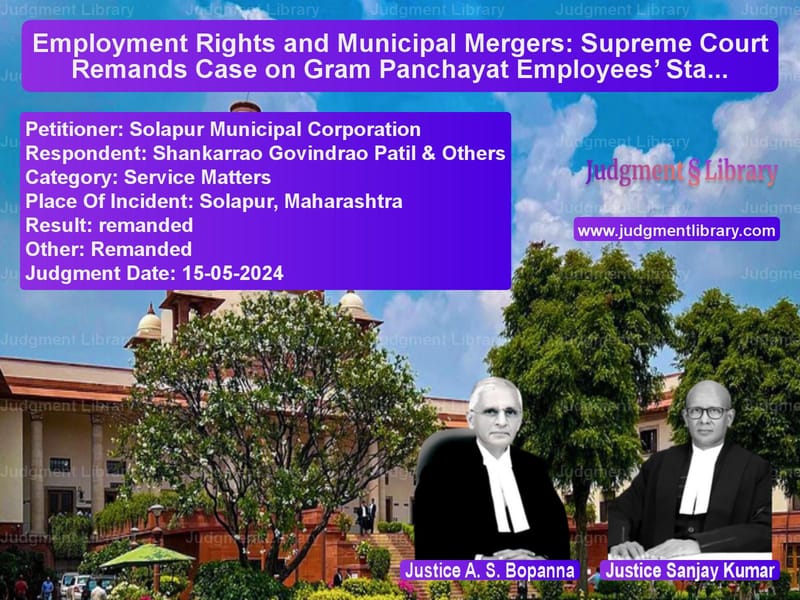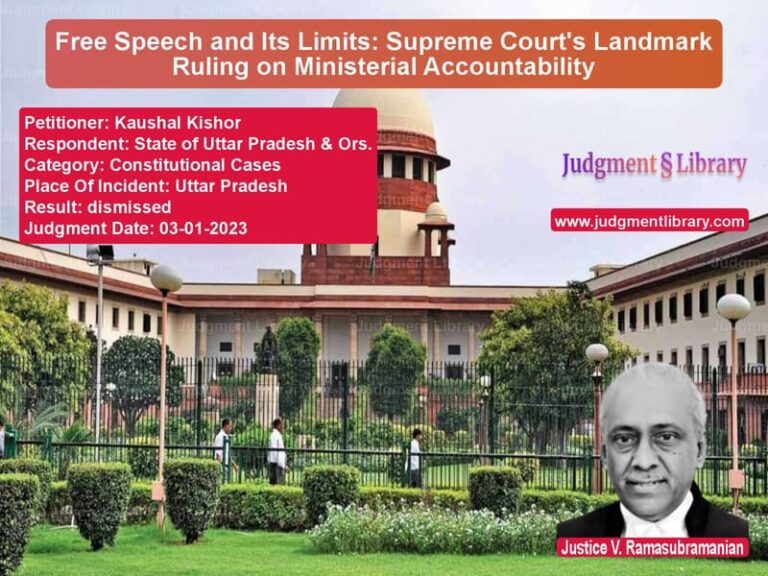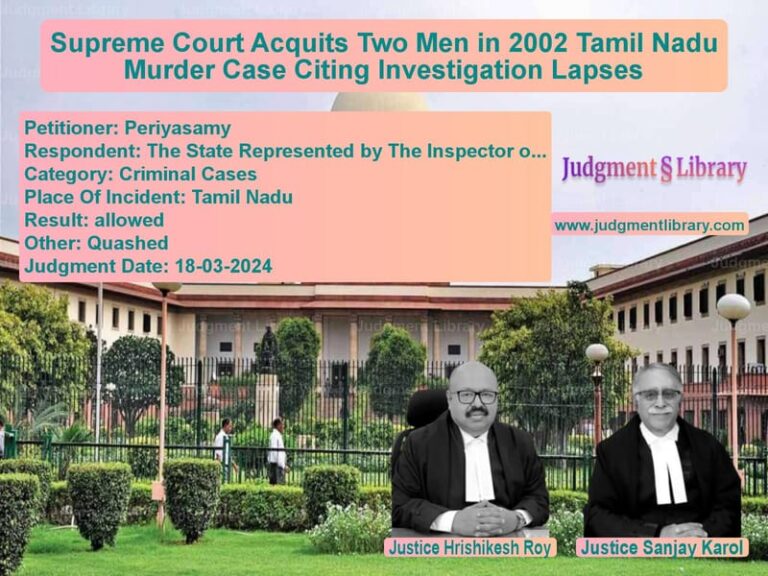Employment Rights and Municipal Mergers: Supreme Court Remands Case on Gram Panchayat Employees’ Status
The case of Solapur Municipal Corporation vs. Shankarrao Govindrao Patil & Others revolves around the employment rights of gram panchayat workers after municipal mergers. This dispute highlights the complexities surrounding the regularization of employees when local governance structures undergo administrative changes. The Supreme Court, in its judgment dated May 15, 2024, remanded the case back to the High Court, emphasizing the need for a thorough examination of newly presented documents that could affect the employees’ status.
Background of the Case
The case stems from the merger of Majarewadi Gram Panchayat and ten other gram panchayats into the Solapur Municipal Corporation on May 5, 1992. Following this merger, employees of these gram panchayats sought recognition as municipal employees from the merger date, arguing that their services should be counted as continuous employment.
The municipal corporation, however, claimed that these employees were retained only as daily wage workers and were not regularized until February 1, 2003. The employees, dissatisfied with this classification, approached the Bombay High Court, arguing that they should be treated as regular municipal employees from the merger date itself.
Read also: https://judgmentlibrary.com/supreme-court-upholds-compulsory-retirement-in-crpf-disciplinary-case/
High Court Rulings
The Division Bench of the Bombay High Court, in its judgment dated July 31, 2013, ruled in favor of the employees, holding that:
- The employees’ services with the gram panchayat before May 5, 1992, must be treated as regular service.
- Their employment with the municipal corporation from May 5, 1992, to February 1, 2003, should be considered continuous and regular.
- They were entitled to full service and retirement benefits.
The Solapur Municipal Corporation challenged this decision and filed review petitions, which were dismissed by the High Court on August 8, 2014. Subsequently, another writ petition (W.P. No. 2463 of 2010) was also decided in favor of another similarly situated employee, further strengthening the employees’ claims.
Arguments by the Petitioner (Solapur Municipal Corporation)
The Solapur Municipal Corporation contested the High Court’s findings, arguing that:
- The employees continued as daily wage workers until 2003 and were never treated as regular staff before that.
- The affidavit submitted by the Urban Development Department stating that 300 posts were sanctioned for gram panchayat employees did not automatically mean their employment was regularized from 1992.
- The employees’ claims were based on assumptions rather than factual evidence.
Arguments by the Respondents (Gram Panchayat Employees)
The employees countered the municipal corporation’s stance, arguing that:
- They were already working in permanent positions in the gram panchayat before the merger.
- The municipal corporation was obligated under Section 493(5)(c) of the Bombay Provincial Municipal Corporations Act, 1949, to recognize their prior service.
- The delay in their regularization was unjustified and had unfairly deprived them of service benefits.
Supreme Court’s Observations
The Supreme Court found that critical new evidence had been presented, which the High Court had not had the opportunity to examine. The Court noted:
“It is an admitted fact that no material was produced by the respondents before the High Court to establish that they were regular employees of Majarewadi Gram Panchayat before the appointed date.”
However, new documents, including Majarewadi Gram Panchayat Resolution No. 83(8), dated March 20, 1992, suggested that all employees working with the gram panchayat until March 31, 1992, were appointed permanently with regular salary and allowances.
The Court further observed:
“The controversy regarding whether these employees were regular or daily wage workers before the merger has not been examined in detail, necessitating a fresh review of the documentary evidence.”
Supreme Court’s Decision
Given the emergence of new evidence, the Supreme Court set aside the High Court’s judgment and remanded the case for reconsideration. The Court directed:
- The High Court must re-examine the employment status of the employees based on the new documents.
- Both parties should be allowed to present further documentary evidence.
- The High Court should expedite the proceedings given the long duration of the dispute.
The Supreme Court emphasized:
“The matter requires detailed verification and consideration of new documents. It is appropriate for the High Court to conduct a fresh adjudication on this matter.”
Implications of the Judgment
The Supreme Court’s decision is significant for several reasons:
- It reinforces the importance of considering all relevant evidence before making employment-related decisions.
- It upholds the rights of employees affected by municipal mergers, ensuring they are not unfairly deprived of service benefits.
- It establishes that retroactive claims regarding employment status require thorough judicial scrutiny.
- It underscores the judiciary’s role in protecting employees from arbitrary administrative decisions.
Conclusion
The case of Solapur Municipal Corporation vs. Shankarrao Govindrao Patil & Others highlights the complexities surrounding employment rights in the context of municipal mergers. The Supreme Court’s decision to remand the case ensures that all relevant documents are properly considered before a final ruling is made.
By directing a fresh review, the Court has provided an opportunity for a fair and just resolution, ensuring that employees’ claims are evaluated based on concrete evidence rather than assumptions. This case sets an important precedent for similar employment disputes arising from governmental administrative changes.
Petitioner Name: Solapur Municipal Corporation.Respondent Name: Shankarrao Govindrao Patil & Others.Judgment By: Justice A. S. Bopanna, Justice Sanjay Kumar.Place Of Incident: Solapur, Maharashtra.Judgment Date: 15-05-2024.
Don’t miss out on the full details! Download the complete judgment in PDF format below and gain valuable insights instantly!
Download Judgment: solapur-municipal-co-vs-shankarrao-govindrao-supreme-court-of-india-judgment-dated-15-05-2024.pdf
Directly Download Judgment: Directly download this Judgment
See all petitions in Employment Disputes
See all petitions in Recruitment Policies
See all petitions in Public Sector Employees
See all petitions in Pension and Gratuity
See all petitions in Judgment by A. S. Bopanna
See all petitions in Judgment by Sanjay Kumar
See all petitions in Remanded
See all petitions in Remanded
See all petitions in supreme court of India judgments May 2024
See all petitions in 2024 judgments
See all posts in Service Matters Category
See all allowed petitions in Service Matters Category
See all Dismissed petitions in Service Matters Category
See all partially allowed petitions in Service Matters Category







